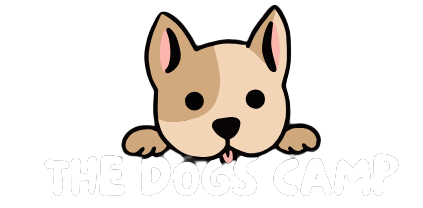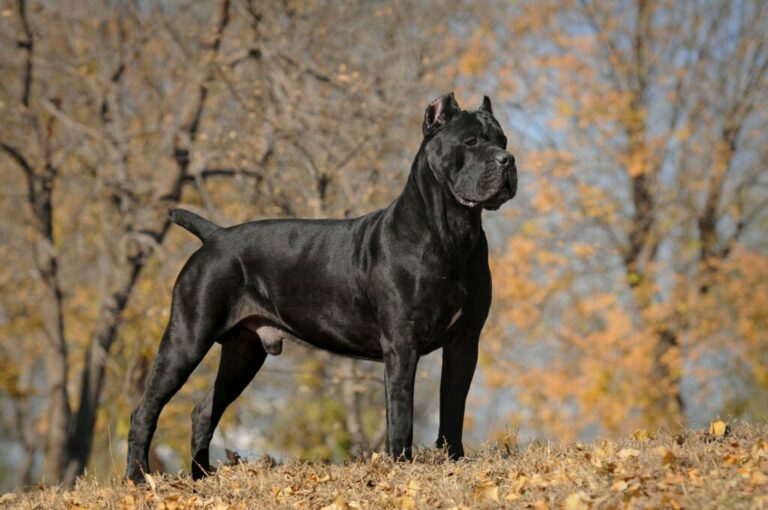Cane Corso Dog Breed and Temperament
Despite their formidable look, the Cane Corsos are intelligent and eager to learn, according to the American Kennel Club, which makes training these purebred dogs smooth sailing. When properly socialized and trained from an early age, these good dogs become affectionate and loyal family companions.
Cane Corsos flaunt short coats that are easy to groom; however, as a working breed, they need plenty of exercise to maintain their physical and mental health. It’s crucial for owners, especially those associated with the Cane Corso Association of America, to be aware of health issues that can affect this breed and to provide a nutritious diet for their large and high-energy needs.
Key Takeaways
- Cane Corsos excels in guarding due to their strength and alertness.
- These good dogs bond closely with the family, swiftly picking up new commands, making them wonderful family dogs.
- Regular exercise and a healthy diet, as advised by the American Kennel Club, are vital for maintaining the wellbeing of these purebred dogs.
Cane Corsos, renowned Italian dogs, offer robust protection and have a history of guarding. While Cane Corsos may look intimidating to some, they are actually intelligent family dogs, receptive to training, and form strong bonds with their caregivers. These large dogs require consistent physical activity and a nutritious diet to maintain their health and satisfaction.
Quick Facts
The Cane Corso is a powerful and attentive dog, ideal for anyone needing a reliable protector. The sturdy Italian breed, Cane Corso, standing tall as per the American Kennel Club, shows males averaging 25-27.5 inches and females measuring between 23.5-26 inches. Expect a Cane Corso to be part of your life for about 9-12 years, showing a balance of warmth, watchfulness, and a solid protective drive.
Their impressive history includes roles as guard dogs, in military service, and hunting, which explains their need for plenty of exercise—around two hours every day—to stay happy and healthy. Owners should watch for health issues such as hip dysplasia and heart conditions, which means regular check-ups are necessary for this breed.
Cane Corso Pictures
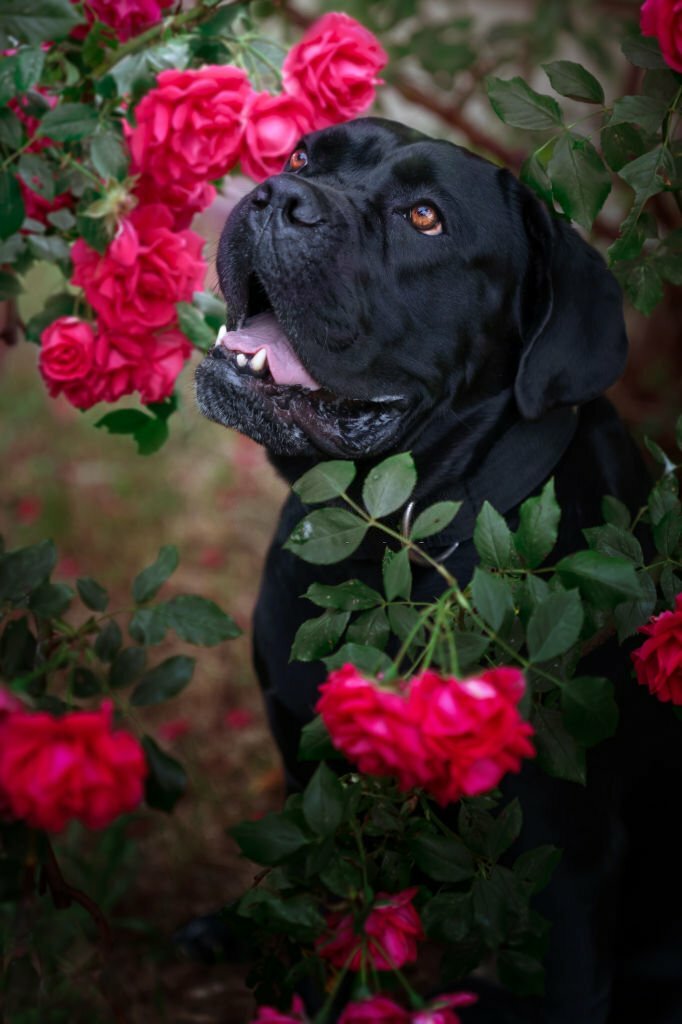
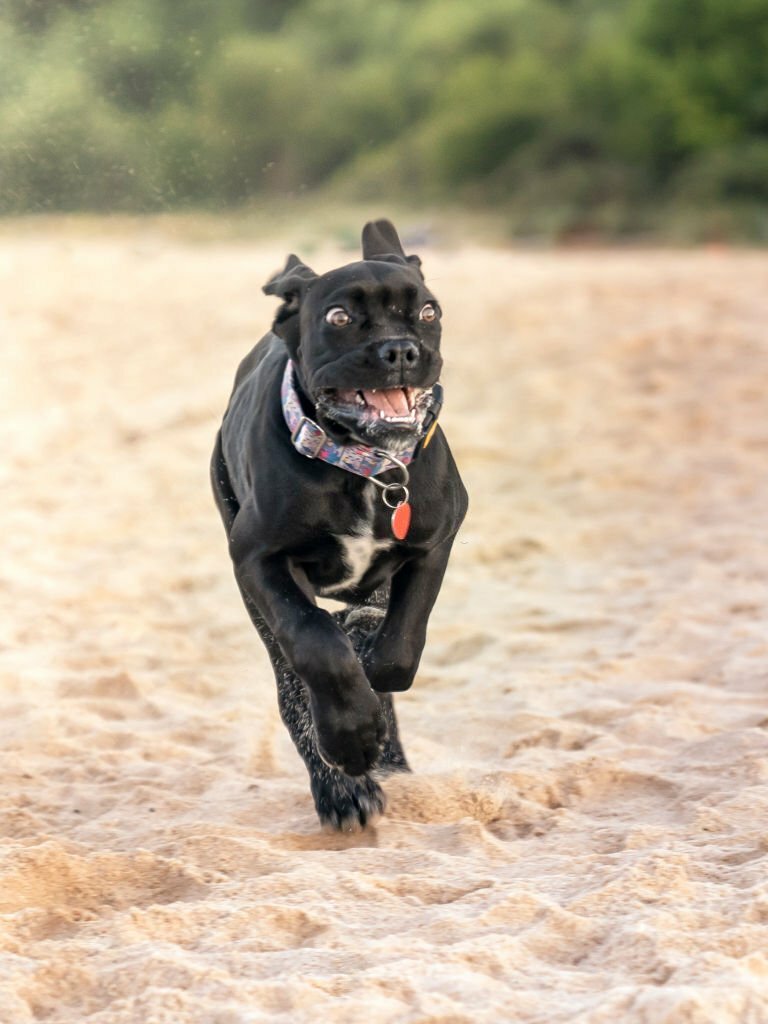
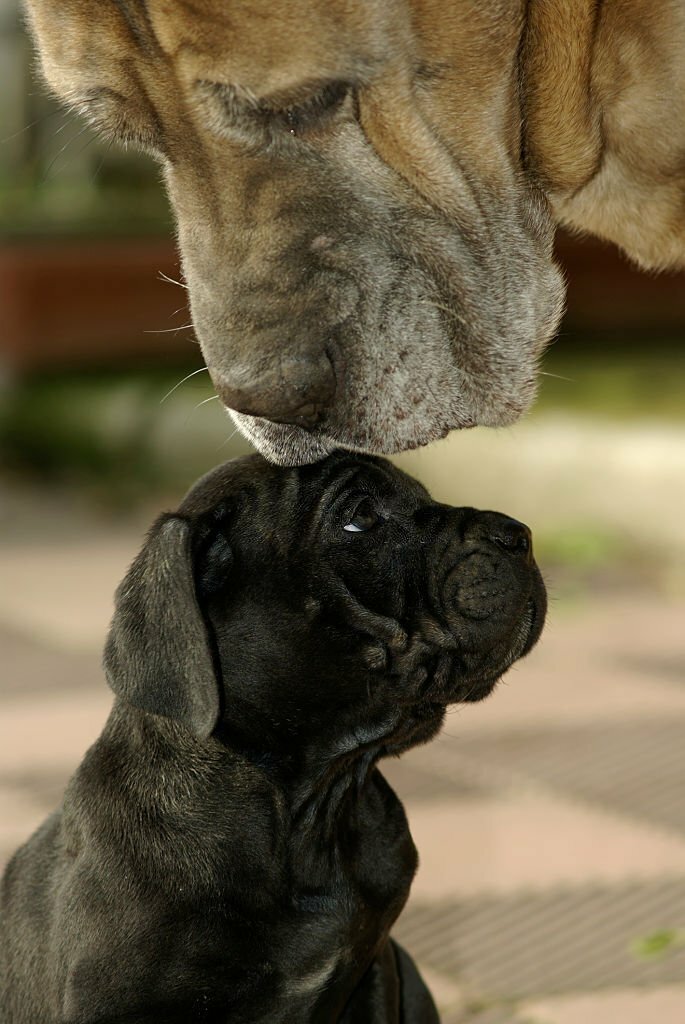
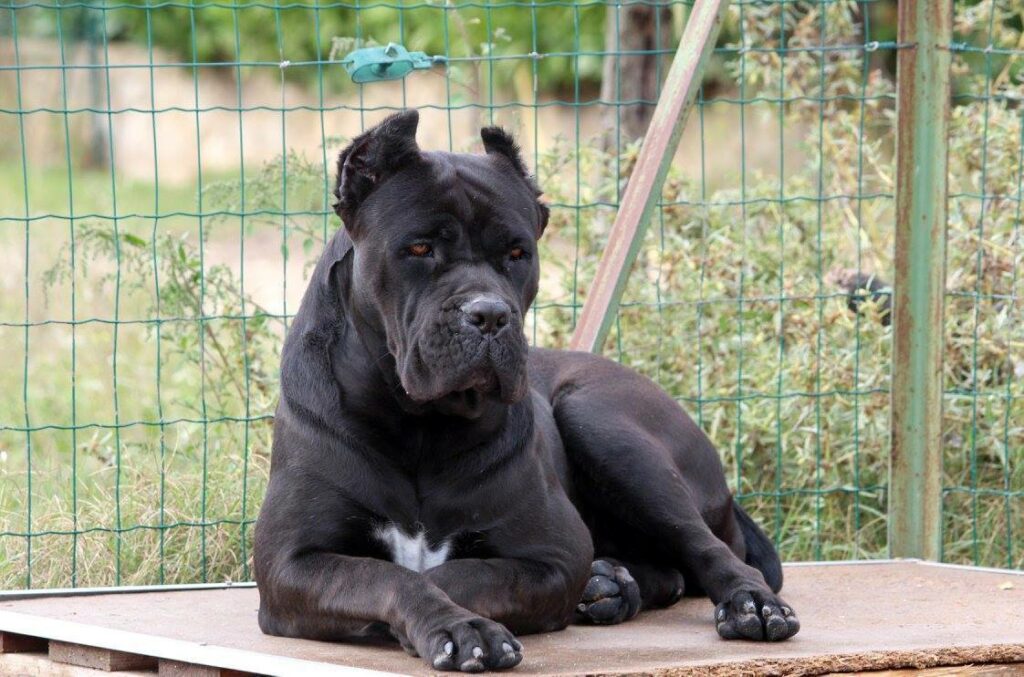
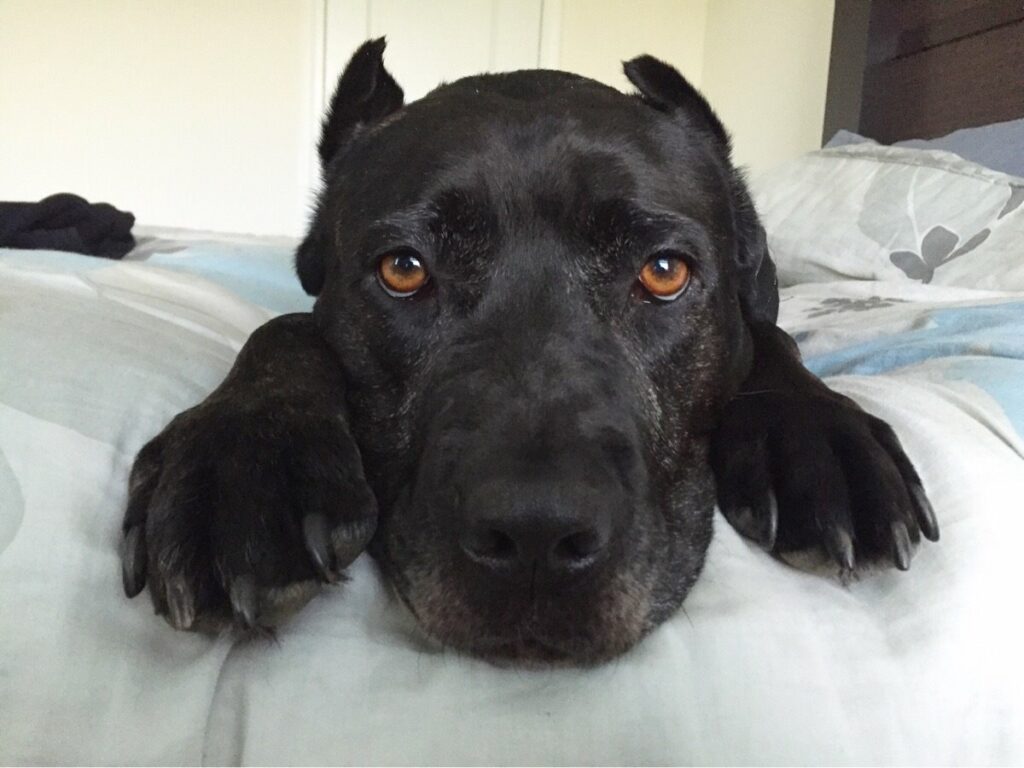
Overview
Originating from Italy, the Cane Corso is a breed of distinction, known for its versatility as a protector, hunter, and loyal family companion. As a representative of the molluscoid type dogs, the Cane Corso Dog Breed commands respect through its imposing presence and robust physique, aligning with the Breed Standard of 23.5-27.5 inches in height and a weight range of 45-50kg.
The breed’s short, dense, and lustrous coat, available in various colors, complements its muscular build. Intelligent and protective, the Cane Corso thrives with proper training and socialization, embodying a perfect balance of power and agility.
Adherence to the Breed Standard ensures the preservation of the Cane Corso’s distinguished characteristics, which have been honed for centuries to meet the demands of both work and companionship.
Key Traits
Cane Corsos are known for their powerful protective instincts, making them excellent watchdogs that give families a sense of safety. These large dogs have a natural talent for guarding, rooted in their heritage. Their intelligence shines through as they quickly pick up on training, adapting to various roles, from personal protection to search and rescue missions. However, this breed’s sharp mind and strong body need engaging outlets; regular training and physical activity are non-negotiable to keep them well-behaved and content.
| Trait | Description |
|---|---|
| Protective | Strong instinct to guard, reliable as both watchdogs and guard dogs |
| Intelligence | Fast learners, adaptable to a variety of jobs |
| Temperament | Confident and composed, yet they know how to handle unfamiliar people |
An assessment of the Cane Corso’s characteristics reveals that they’re best matched with dog owners with the knowledge and dedication to provide consistent training and plenty of exercise. These dogs have a high prey drive, which must be carefully managed, particularly in homes with other animals. Their calm but assertive nature towards strangers makes them ideal for those looking for a robust and dependable companion.
Breed Origins
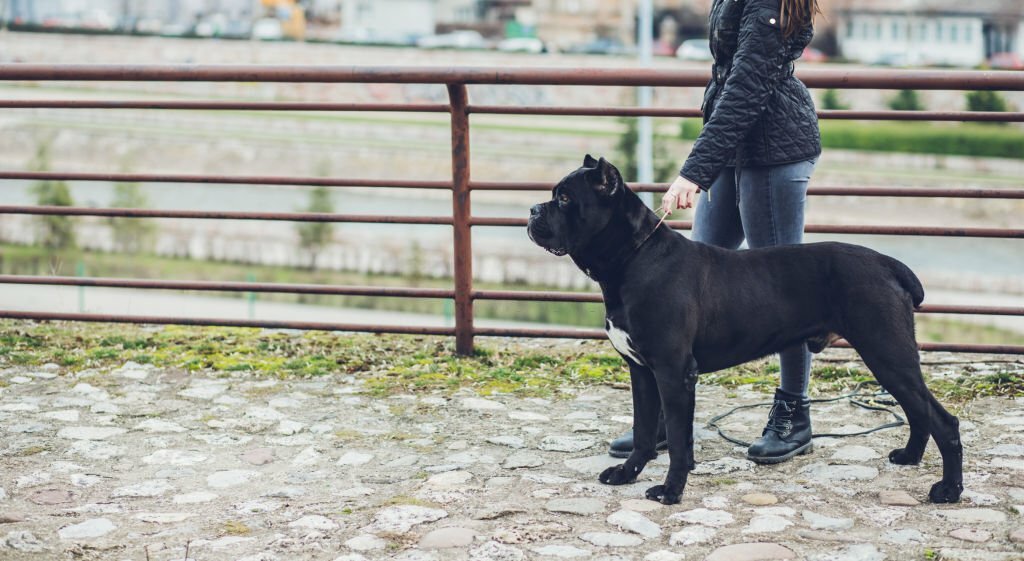
The Cane Corso has roots traced back to ancient Rome, serving as a multifunctional dog. Throughout history, the breed adapted to different roles, from a soldier’s ally to an indispensable part of rural communities in Italy.
After a significant drop in their population following the rise of industrialization, the breed saw a revival in the late 20th century. This comeback was mainly due to breed enthusiasts committed to conserving the Cane Corso’s noble heritage.
- Origins in Ancient Rome
- Roles in Historical Society
- Ability to Adapt and Change
- Revival and Conservation Efforts
Ancient Roman Lineage
The Cane Corso, rooted in the Roman Empire, is believed to have descended from the mighty war dogs that marched with Roman legions. These powerful mastiff-type dogs were bred for the intense conditions of warfare and the challenging environment of those times.
Careful examination of historical documents and selective breeding have maintained the Cane Corso’s lineage, connecting it to a remarkable history. This breed is known for its ability to hunt large animals and its effectiveness in herding and guarding, which are critical aspects of its Roman legacy.
Over time, the Cane Corso has evolved from a soldier’s ally to a multifaceted working dog, reflecting the strength and functionality of its ancestors.
Historical Roles
The Cane Corso has a long and versatile history, having evolved from a Roman war dog to a trusted farm guardian and skilled hunter. The breed’s ability to adapt is impressive, especially after the decline of traditional sharecropping in Italy.
Thanks to the passionate work of the Cane Corso Association, this breed has made a strong comeback, highlighting its enduring legacy and modern-day importance.
Cane Corsos have always been valued for their practical skills, from managing livestock to tracking large prey. These dogs remain reliable guardians for families and farms, connecting us to a rich heritage.
Evolution Over Time
The transformation of the Cane Corso from its roots in ancient Rome to the well-known breed of our times is a story of change and endurance.
After Rome’s empire crumbled, the Cane Corso’s role evolved, becoming vital for farmers in Italy, especially those involved in the mezzadria sharecropping system.
When this farming system declined, so did the number of Cane Corsos.
Their resurgence in the 1980s is credited to passionate breed lovers who formed the Società Amatori Cane Corso.
These individuals launched careful breeding plans to revive the breed’s distinctive traits, which led to their official recognition by dog registries.
Thanks to these efforts, today’s Cane Corso maintains its impressive build and multifaceted skills, making it a respected breed with a rich heritage and functional attributes.
Physical Dimensions
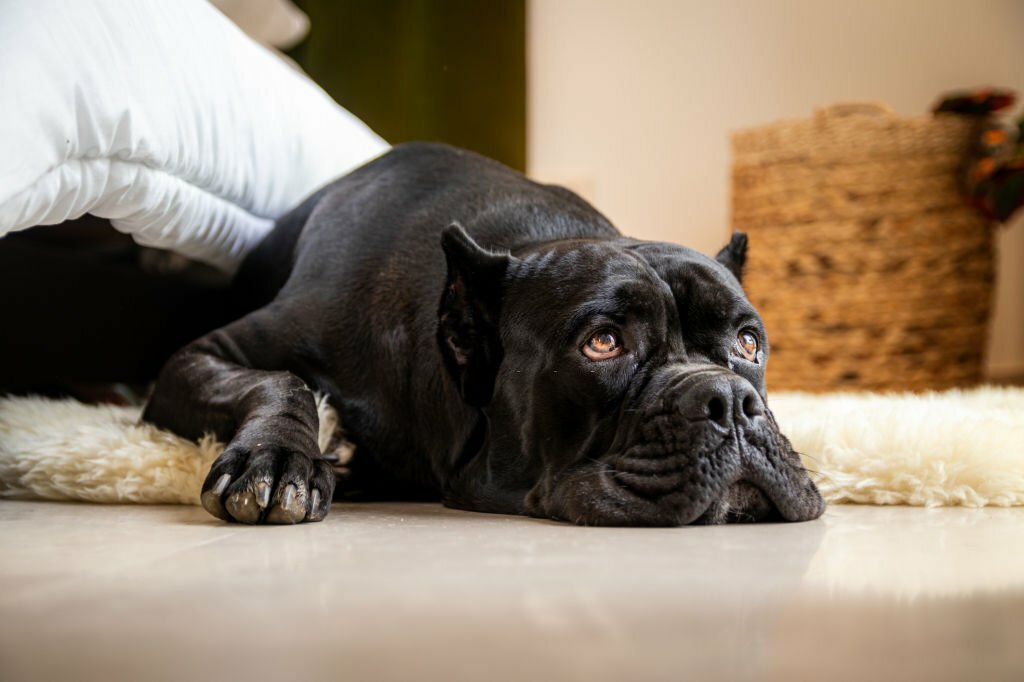
The Cane Corso stands out for its impressive size, reflecting its history as a dedicated protector. These dogs have a clear difference in size between males and females, highlighting their intimidating stature and muscular physique. A closer look at their attributes shows they were bred for power and speed, with their coat and physical features adding to their unique profile.
- Height and Weight: A detailed look at the size differences between male and female Cane Corsos.
- Body Build Types: An insight into the breed’s solid and sturdy structure.
- Coat Length Variations: A description of the Cane Corso’s coat types and the variety found within the breed.
- Tail and Ear Shape: How traditional practices like tail docking and ear cropping have influenced the breed’s appearance.
Height and Weight
Cane Corso dogs are known for their impressive size. Male Cane Corsos stand between 23.5 and 27.5 inches at the shoulder, while female Corsos are usually between 23.5 and 26 inches. This size difference between the sexes is quite common in the breed.
As for their weight, males generally weigh between 90 and 120 pounds, and females are a bit lighter, ranging from 70 to 90 pounds. These measurements are not just numbers – they’re a reminder that Cane Corsos, as part of the working group, needs plenty of space to move and regular exercise to stay healthy and fulfilled.
Body Build Types
The Cane Corso is a breed built like a tank, showcasing strength and grace within its muscular body. Originating from a lineage of versatile working dogs, this breed is powerful and agile.
Males stand tall at about 25 to 27.5 inches, while females measure around 23.5 to 26 inches at the shoulder. Their weight complements their height perfectly, allowing these dogs to move with remarkable ease for their size.
A male Cane Corso tips the scales at 90 to 120 pounds, whereas females weigh a bit less, ranging from 70 to 90 pounds. Their broad heads and solid bodies, which should be around 62 to 70 centimeters at the withers and weigh between 45 to 50 kilograms, are the epitome of the breed’s robust nature.
Coat Length Variations
The Cane Corso’s coat is sleek, short, and smooth, ideal for this active breed. Its short coat length is perfect for a working dog that needs to move quickly without the hindrance of heavier fur.
The dense fur also acts as a natural protective layer, supporting their muscular build and making grooming simple for owners. Since they don’t have a double coat, Cane Corsos stay cooler during high-energy activities, which suits their needs well.
This breed’s coat is a clear example of how they have adapted for peak performance and utility in their work.
Tail and Ear Shape
Tail and ear modification practices in Cane Corsos have a history rooted in their roles as protectors. Shortening the tail, or docking, aimed to minimize injuries during demanding activities like hunting or protecting their territory. Trimming the ears, known as cropping, was thought to sharpen their alertness and prevent ear injuries. These changes gave the Cane Corso its distinctive, intimidating look.
However, these modifications are now under scrutiny due to growing concerns over animal welfare. Many are questioning the necessity of continuing these practices, leading to a shift in how we view the treatment of animals in modern times. The conversation around the ethics of docking and cropping is evolving, with a significant focus on the well-being of the dogs.
Size Comparison Breeds
Moving away from historical changes to tails and ears, looking at the Cane Corso’s size relative to other dogs is essential. The Cane Corso stands between 23.5 and 27.5 inches tall at the shoulder and tips the scales at 70-120 pounds. This makes them a large and powerful breed.
In contrast, the Neapolitan Mastiff, a close cousin in the Mastiff family, often weighs more due to its heavier build and loose skin. However, the Cane Corso typically has a more athletic physique; it is less bulky but still very muscular.
This shows that the Cane Corso is well-suited for jobs requiring strength and agility, such as guard work or search and rescue missions.
Temperament Traits
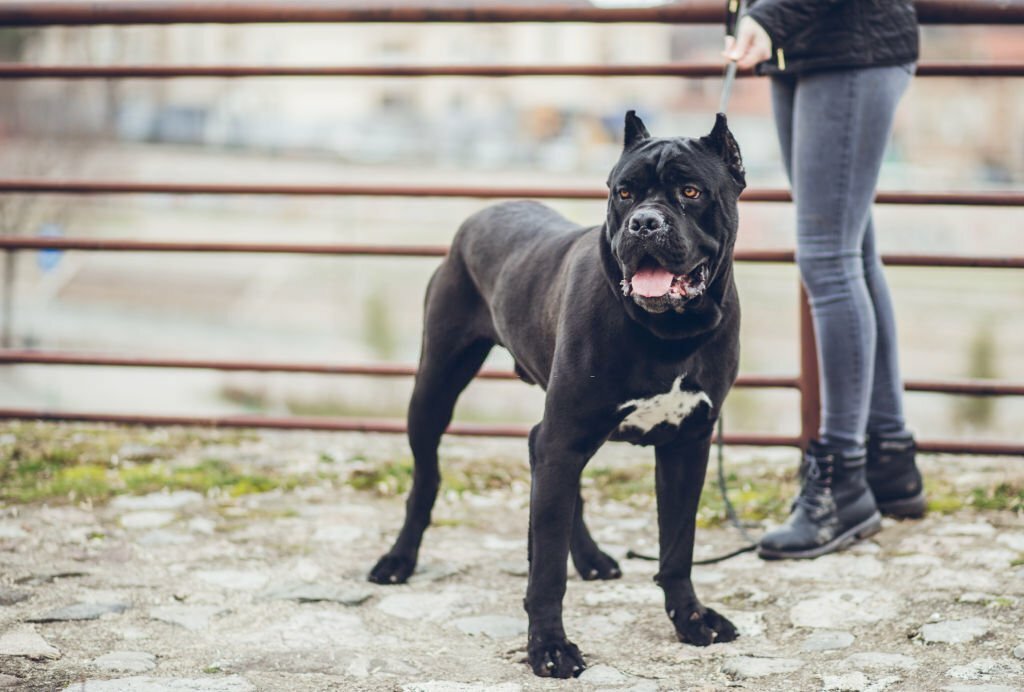
The Cane Corso stands out with its assertive nature, often misunderstood as aggression. Yet, with the proper guidance, these dogs are protectors, offering safety without unnecessary charge. They need early socialization and regular training to direct their strong personalities and avoid dominant behaviors.
These dogs are loyal guardians who show unwavering commitment to their families. Their intelligence makes them highly trainable, adapting well to different learning methods. Owners should introduce them to various settings early to promote adaptable and well-rounded behavior.
Assertive, Not Aggressive
Cane Corsos are often mistaken for being aggressive when they’re just assertive. This trait reflects their confidence and attentiveness, especially when trained and socialized well.
People sometimes misjudge the breed’s natural behavior as aggression, but it’s their instinct to protect and their ability to assess situations.
Practical training is critical for Cane Corso to become the gentle giant they have the potential to be. Their assertiveness comes from their intelligence and dedication to their owners, so they need someone who can guide them with a solid yet kind hand.
When trained with care, these dogs show a harmonious mix of strength and grace rather than undue aggression.
Loyal Family Protector
The Cane Corso stands out among dog breeds as a dedicated guardian for families, blending alertness with warmth in its personality. Known for being an outstanding guard dog, the Cane Corso has a deep-seated sense of loyalty to its human companions.
This dog’s instinct to protect is deeply embedded in its psyche, not just a side effect of its strength. Even with a tough exterior, a Cane Corso shows genuine affection to its family, striking a perfect balance between gentleness and resilience.
Their calm and steady nature means they have controlled protective instincts, making them trustworthy protectors who prioritize their family’s safety and happiness.
Requires Early Socialization
For the Cane Corso, early socialization is vital to raising a well-balanced and friendly adult dog. Exposure to different situations, people, and animals is critical, as this breed is intelligent and naturally protective.
Training them consistently from a young age helps prevent excessive guarding behaviors and positively directs their instincts. A well-socialized Cane Corso can accurately identify threats and remain composed, making them an excellent family pet and a reliable working dog.
Intelligent, Trainable Nature
The Cane Corso is known for its sharp mind and ease of training. They pick up new commands swiftly and are up for various tasks, so they’re valued as multifaceted working dogs.
Their eagerness to learn isn’t only due to their smarts; they also want to connect with their owners and make them happy. When trained with kindness, consistency, and understanding of their psychological and emotional requirements, these dogs shine.
Positive reinforcement methods work exceptionally well with them, tapping into their willingness to cooperate.
Potential for Dominance
Given their natural inclination to assert themselves, Cane Corsos needs an owner who can confidently set rules and demonstrate leadership. This breed thrives on training that balances firmness with respect, guiding their instinctual desire to lead towards positive behavior.
Consistent and gentle training methods are crucial to developing a well-adjusted dog that respects its human family. Owners should also be mindful of the breed’s health, opting for exercises that do not harm their joints, as conditions like hip dysplasia are common.
A Cane Corso’s assertive nature can be channeled with the right approach to create a loyal and loving pet.
Health Concerns
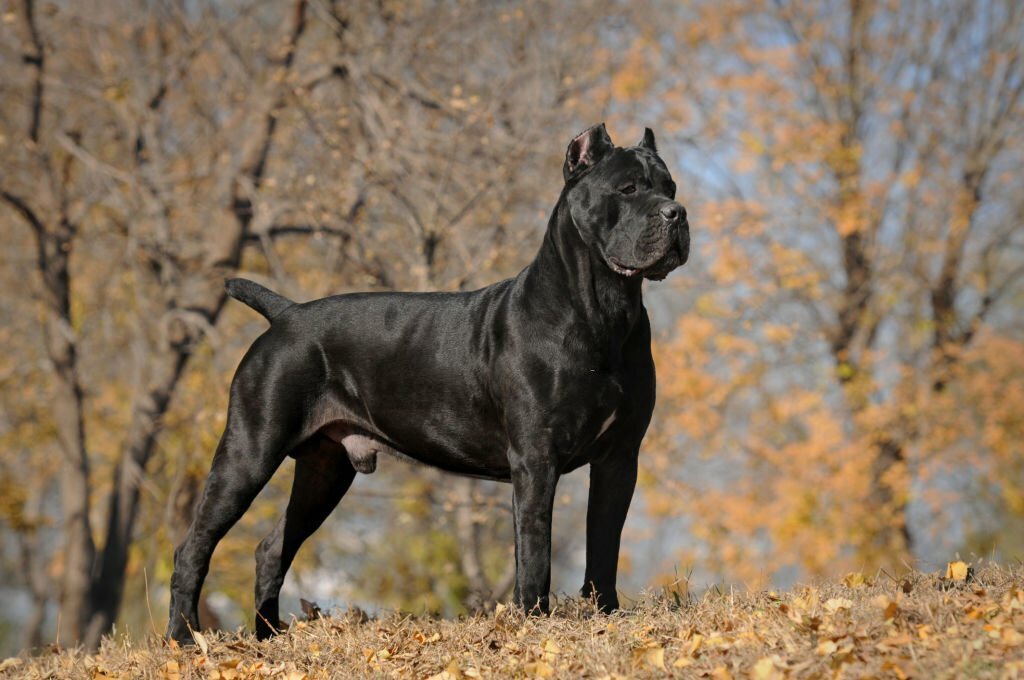
Cane Corsos, like all dog breeds, has health issues that potential owners need to be aware of. Being informed about the breed’s common genetic problems and the health challenges they may face as they age is vital for setting up a plan to keep them healthy. Owners should be vigilant in checking their dog’s health and not hesitate to consult a vet to prevent and address these health risks.
Common Genetic Disorders: A closer look at the hereditary conditions often found in Cane Corsos.
Lifespan & Aging Issues: Considerations about the breed’s expected lifespan and the health complications of getting older.
Preventative Health Measures: Tips for recognizing and preventing diseases early in Cane Corsos.
Importance of Regular Veterinary Care: Regular vet visits ensure a Cane Corso’s well-being.
Common Genetic Disorders
Cane Corso dogs, with their large stature, are prone to specific health issues. Ethical breeders often screen for hip dysplasia, a condition common in this breed, to ensure the well-being of cane corso puppies. These dogs, known for their broad chests, can suffer from gastric dilatation-volvulus, a critical condition that demands quick veterinary care to save the dog’s life. Eye problems such as ectropion, where the lower eyelid droops, must be addressed promptly to prevent damage to the dog’s eyes.
Neurologically, Cane Corsos may experience idiopathic epilepsy, which can be troubling for both the dog and its owner. Regular check-ups with a vet are vital to manage this condition. It’s also essential to monitor their diet closely to prevent disorders related to rapid growth and ensure they maintain a healthy weight for their size.
Lifespan & Aging Issues
Cane Corsos typically live for about 10 to 12 years. During their lifespan, they may develop several health issues that require careful attention and preventative care.
One common ailment in these dogs is hip dysplasia, which can lead to mobility challenges and discomfort in their later years. Another severe health risk is gastric dilatation-volvulus, also known as bloat, which can quickly become fatal if not treated immediately. Giving them smaller meals throughout the day and avoiding heavy activity post-feeding is advised to prevent such conditions.
Owners should consistently watch for symptoms of ectropion and epilepsy. Regular vet visits, a nutritious diet, and suitable exercise are vital to keeping a Cane Corso healthy and happy as they grow older.
Preventative Health Measures
Cane Corso owners can protect their dogs’ health by choosing breeders who prioritize the breed’s well-being. Good breeders perform health screenings for genetic conditions like hip and elbow dysplasia and heart disease.
Keeping up with regular vet visits, managing your dog’s weight, and providing a nutritious diet are vital to preventing health problems.
A safe and suitable living space is crucial in ensuring a healthy life for these strong and loyal dogs.
Maintenance & Well-being
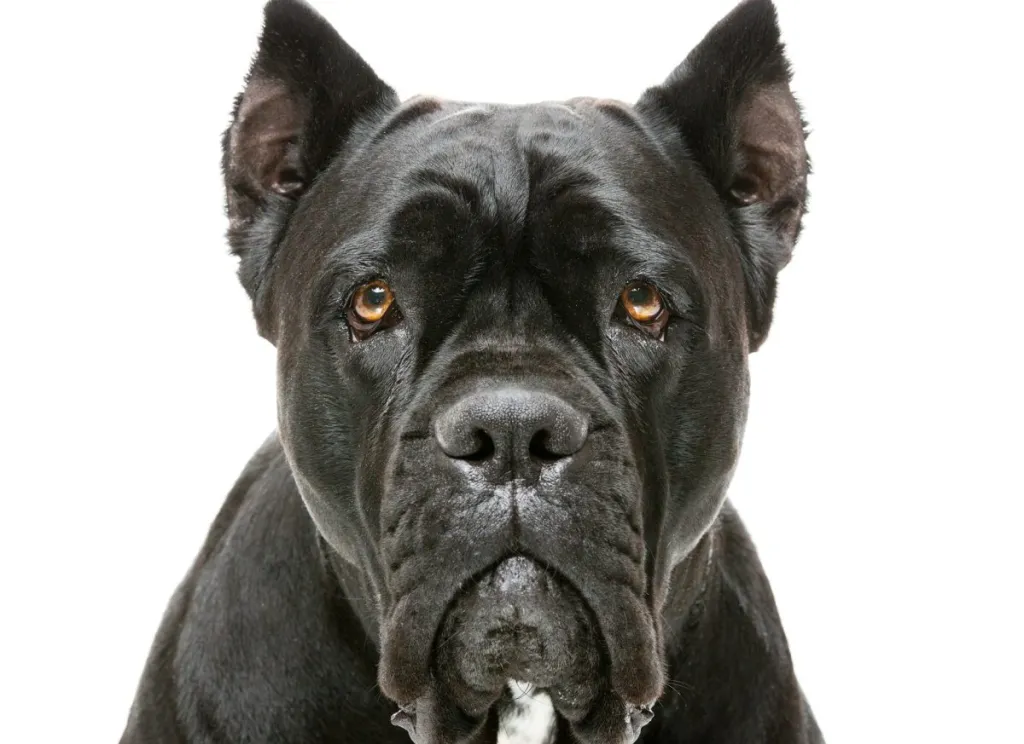
Caring for a Cane Corso involves more than love; it requires a detailed routine that covers their physical and mental health. This breed is known for its strength and requires regular grooming, exercise, and careful health supervision to keep them in top shape.
- Grooming Essentials: Brush them frequently to reduce hair loss and keep their coat sleek.
- Fitness Routine: Engage them in daily activities to maintain their muscle tone and sharp minds.
- Health Check-ups: Stay ahead of potential health issues with frequent vet visits.
- Nutritional Needs: Provide a diet for their large build and high energy.
A Cane Corso’s mind is as essential as its body, so consistent training is critical to a well-behaved pet.
Grooming Requirements
Cane Corsos are easy to groom, which helps keep them healthy and clean. Their short, coarse coat only needs a weekly brushing to stay shiny and reduce shedding. Occasional baths help keep them fresh but should be spaced out to maintain the coat’s natural protective oils.
Checking the ears for infections or wax buildup is integral to their care. Regular nail trims are necessary to avoid discomfort and walking problems.
Keeping up with these simple grooming steps promotes your Cane Corso’s brindle health and strengthens your bond with your pet.
Exercise Regimen
Daily exercise is a must to keep a Cane Corso healthy and happy. These muscular dogs thrive on at least an hour of physical activity like running or agility courses. Without this, they may develop behavioral problems and lose muscle condition. This is not just a suggestion; regular exercise is vital for their well-being.
Cane Corsos are also quite intelligent and need activities that challenge their minds. Obedience training and dog sports are great ways to keep their brains sharp. Engaging in these types of exercises regularly is critical to their physical and mental health, significantly enhancing their life.
Health Screening
Regular vet check-ups are crucial to keeping a Cane Corso healthy and full of life. These check-ups are vital in catching and treating common breed-specific issues early, such as hip and elbow dysplasia, heart disease, and other inherited conditions.
Keeping an eye on a dog’s weight is vital, too, because sudden changes can point to thyroid problems or metabolic issues.
A structured approach to health checks helps create a solid plan for the dog’s ongoing health, improving their overall happiness and extending their lifespan.
Diet Considerations
Feeding your Cane Corso properly is essential to keeping them healthy and happy. These large dogs need a diet rich in nutrients that matches their activity level to prevent common issues like hip dysplasia and stomach bloat.
Careful portion control can help maintain a healthy weight, reducing the risk of obesity and its complications. Splitting their meals into at least two servings a day is an excellent strategy to reduce the chances of gastric problems, including potentially fatal stomach torsion.
Treats should be given sparingly to avoid disrupting their nutritional balance. Despite the higher cost, investing in premium dog food pays off by supporting the health and energy of your Cane Corso.
Behavioral Training
Teaching your Cane Corso the correct behavior is critical to having a happy and well-behaved pet. These dogs are intelligent and have an instinct to protect, so they need a training plan that’s both thoughtful and consistent.
Positive reinforcement, like using a clicker, works well with their desire to please and helps them learn what behaviors are rewarded. This approach creates a positive learning environment that supports your dog in getting comfortable around new people by associating strangers with good experiences.
Since Cane Corsos have a lot of energy, combining physical exercises with their training is vital for keeping them healthy in body and mind. Activities that challenge them mentally, like obedience training and dog sports, keep their minds sharp and help strengthen the bond between you and your pet.
Dietary Requirements
A Cane Corso’s diet is crucial to its health and lifespan. It’s essential to give them the proper nutrients, especially protein, to keep their muscles strong and fit for their energetic lifestyle. Dog owners must pay attention to how often they feed their Cane Corsos and choose foods that avoid triggering any allergies to ensure they get what they need for a healthy life without complications.
- Proper Protein Levels are crucial for muscle upkeep and overall body health.
- Regular Meal Times: Helps maintain consistent energy and avoid stomach problems.
- Special Diets for Allergies: It is essential to reduce the chances of adverse reactions to food.
- Balanced Nutrition: Necessary for healthy growth and avoiding a lack of nutrients.
Optimal Protein Content
Checking and adjusting the protein levels in your Cane Corso’s food is vital for their health and well-being. A diet with the right amount of protein helps maintain their strong muscles and support their active lifestyle. It’s especially crucial for large breeds like Cane Corsos, prone to joint issues such as hip dysplasia.
Yet, it’s necessary to get the balance right because too much protein can lead to other health problems, including weight gain. Always consult with your vet to tailor your dog’s diet to their specific needs, ensuring they get all the benefits without any risks to their health.
Feeding Frequency
For a Cane Corso, setting the proper feeding schedule is critical for their health. Due to their large size and potential dietary issues, these dogs do best with two meals daily. This helps prevent severe conditions like bloating and stomach torsion.
Monitoring your dog’s weight and activity can help you effectively adjust their food portions and meal times. Since obesity is a risk for Cane Corsos, it’s vital to measure their food carefully.
Always consult a veterinarian to ensure that the diet meets your dog’s specific needs and to prevent the adverse effects of overfeeding or poor nutrition.
Allergy-Specific Diets
Caring for the Cane Corso breed involves creating a custom diet to prevent allergic reactions. These dogs can have adverse reactions to specific ingredients that harm their health. Working closely with a veterinarian to pinpoint the exact allergens is smart.
With this knowledge, you can create a diet that omits these ingredients. Such careful attention to a dog’s diet supports their health and helps breeders understand the breed’s sensitivities.
To effectively manage allergies, it’s critical to be precise in the quantity and quality of the dog’s food, supporting their overall well-being and development.
